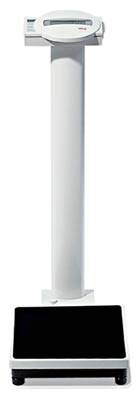Home » Hospital & Durable Medical Equipment » Doctor Scale Options For General Practices & Specializations » Doctor Scale Options For General Practices & Specializations
Doctor Scale Options For General Practices & Specializations

Seca Digital Weighing & Measuring Station w/ Auto BMI Calculation
Retail Price: $1,401.74
Your Price: $965.89

Seca Electronic Column Digital Scale
Retail Price: $345.00
Your Price: $289.89
 Unit: single
Unit: single

Digital Column Weighing Scale - 100 lbs. Capacity
Retail Price: $635.50
Your Price: $504.90
 Unit: single
Unit: single
Doctor scale models, which may also be called clinical scales, are not a piece of examination room equipment that typically gets much consideration. They are one of those devices that tend to blend into the surroundings rather than really be a primary consideration. You may be surprised to find out that there are variations in scales that can add to your use of the device.
New methods of actually tracking patients or people's weigh and overall health have changed the way the measurements are taken. Many doctors, trainers and therapists now prefer to measure BMI or Body Mass Index rather than simply taking a weight. This allows the patient to see how body composition, not weight alone, is contributing to any potential or current health issues. The great news is that there are a variety of different doctor scale options out there that convert weight and height measurements into BMI numbers.
These options are typically the digital read out clinical scales. They are usually the column models but there are some floor models that provide the same information. As the person steps on the scale the weight is provided in either pounds or kilograms on the digital LED display. Then, the technician, nurse or user measures their height and puts that into the data through the use of the keypad. The scale automatically calculates BMI and in some models it is possible to print out with a thermal printer the results of all measurements. This makes data entry into charts very simple and even allows patients or people to keep hard copies of their weight and BMI over time.
An important consideration for many offices that use clinical scales is the type of power supply they may required. Of course manual column styles or mechanical floor models do not require a power source. This means there is no additional need for an electrical outlet in the area where the scale is used or the need to constantly change out batteries. In very busy medical practices, gyms, schools or care facilities this may be a very important consideration.
The advantage to a LED display on a doctor scale may offset the possible drawbacks in specializations and general practices. In fact the LED display can help to reduce errors in reading the scale, which can be an issue if staff rushes through the use of a mechanical model and doesn't let the indicator come to a full stop. LED displays also tend to provide a higher level of accuracy. This can include measuring to the gram or fraction of a pound that is often needed in specialized practices. Having the option to tare the scale may also be a major consideration in a pediatric or infant specialization practice or in areas where children as well as adults may use the device.
As a general use type of doctor scale in a clinical practice a portable option may be the best. This saves the need for a scale in each patient examination room or patient care room. Doctors and staff can move the lightweight floor type of weighing system between rooms and, with options that even provide a remote indicator it is never difficult to use the scale. The indicator on many models can also key in height and allow BMI calculations for a really practical option.
Other specializations may need doctor scale models that have a higher capacity. This would include bariatric specializations or general practitioners that may have bariatric patients. Again, like a portable scale, a remote device can be used to display the patient's weight and BMI. This can be helpful in research type settings or for trainers as well as for physicians. These larger capacity scales often have a slightly larger platform that is designed to be comfortable and very stable for larger individuals.














